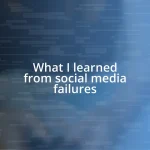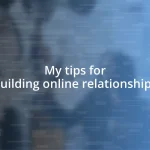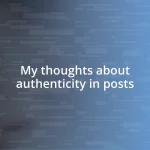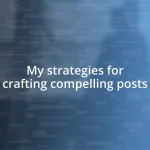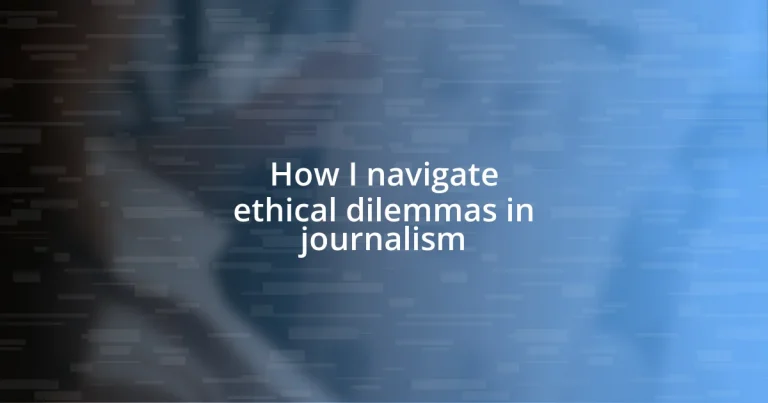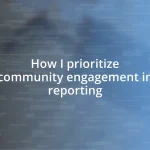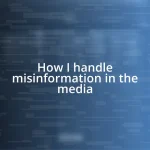Key takeaways:
- Journalists face ethical dilemmas constantly, balancing the obligation to report truthfully with the potential emotional impact on individuals involved.
- Utilizing ethical theories like utilitarianism, deontology, and virtue ethics can guide journalists in making responsible reporting decisions that align with their values.
- Mentorship and peer feedback are essential for navigating ethical challenges in journalism, fostering accountability and enhancing the quality of reporting.
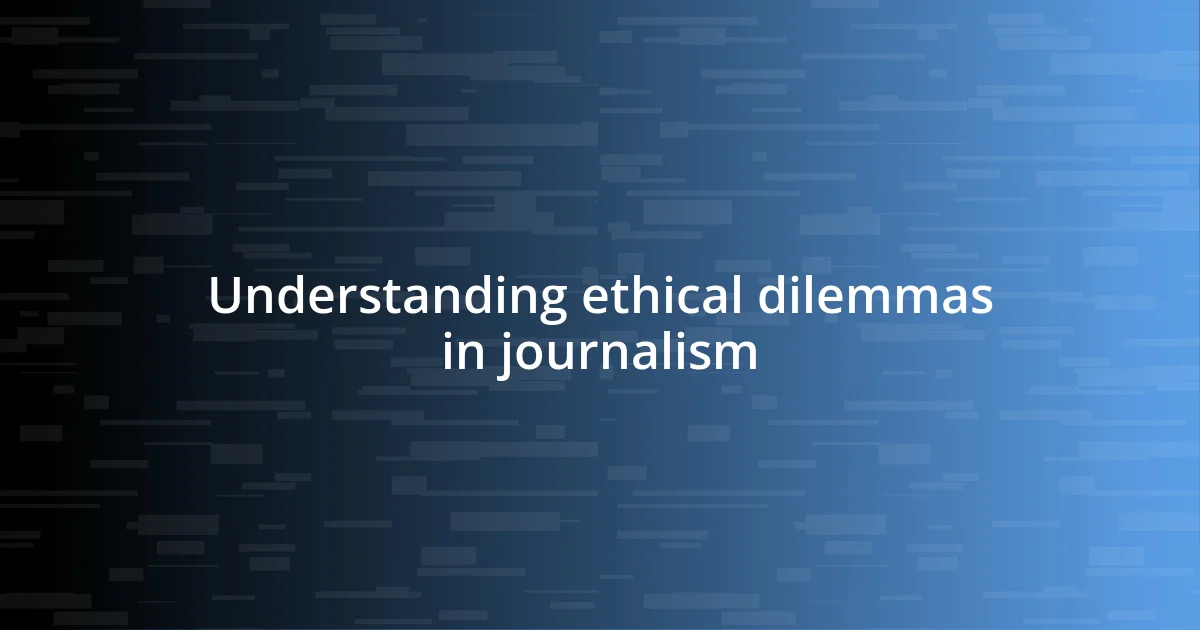
Understanding ethical dilemmas in journalism
Ethical dilemmas in journalism often arise when the truth clashes with the potential consequences of revealing it. I remember a time when I had to decide whether to publish details about a public figure’s personal life that could have significantly impacted their career. It made me question: is the pursuit of truth worth the personal cost to someone else’s life?
Throughout my career, I’ve faced situations where the ethical lines felt blurred. Should I prioritize my obligation to inform the public, or should I consider the fallout on individuals involved? In one instance, I reported a story that had widespread implications, yet it carried the risk of causing emotional distress to a family involved. This tug-of-war between responsibility and compassion is something that haunts many journalists like me.
The complexities of these dilemmas are not just about hard choices; they are about the emotional weight we carry as reporters. I often think back to how I balanced my duty with my empathy, realizing that each decision could resonate far beyond just the headline. Isn’t it fascinating how every story we tell is interwoven with human experiences and ethical threads we must navigate carefully?
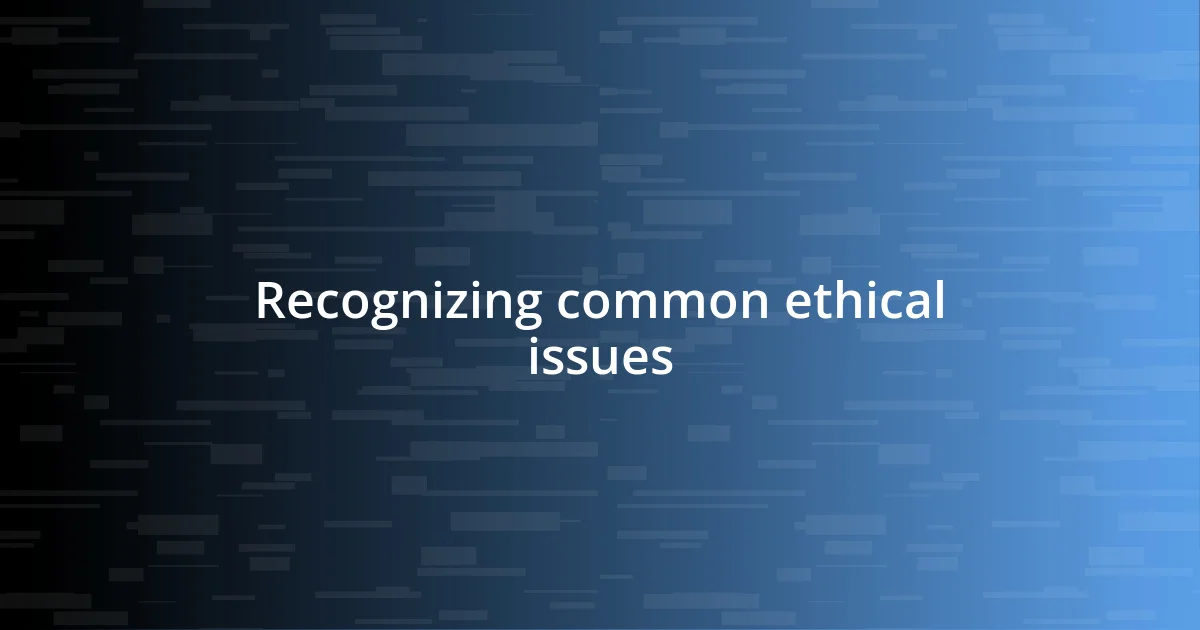
Recognizing common ethical issues
Recognizing common ethical issues in journalism is crucial for anyone in the field. I often found myself identifying dilemmas related to sensationalism, privacy, and the balance between accuracy and timeliness. There’s a fine line between reporting a story that captures attention and respecting the dignity of those involved. In one situation, I uncovered a scandal that could have rocked an entire community. It was tempting to go all out, but I paused and reflected on how it might devastate the lives intertwined with that story.
Common ethical issues that journalists encounter include:
- Sensationalism: Prioritizing eye-catching headlines that may distort the truth.
- Invasion of Privacy: Balancing public interest against an individual’s right to privacy.
- Conflicts of Interest: Navigating relationships or benefits that could compromise objectivity.
- Misrepresentation: Being wary of how language or imagery can influence perceptions.
- Dilemma of Attribution: Deciding whether to protect sources at the expense of transparency.
I remember feeling the weight of responsibility when I chose to give a voice to marginalized communities instead of focusing on clickbait. It’s these decisions that shape not just our careers but the community’s trust. Recognizing these issues is the first step towards navigating the tumultuous waters of journalism with integrity.
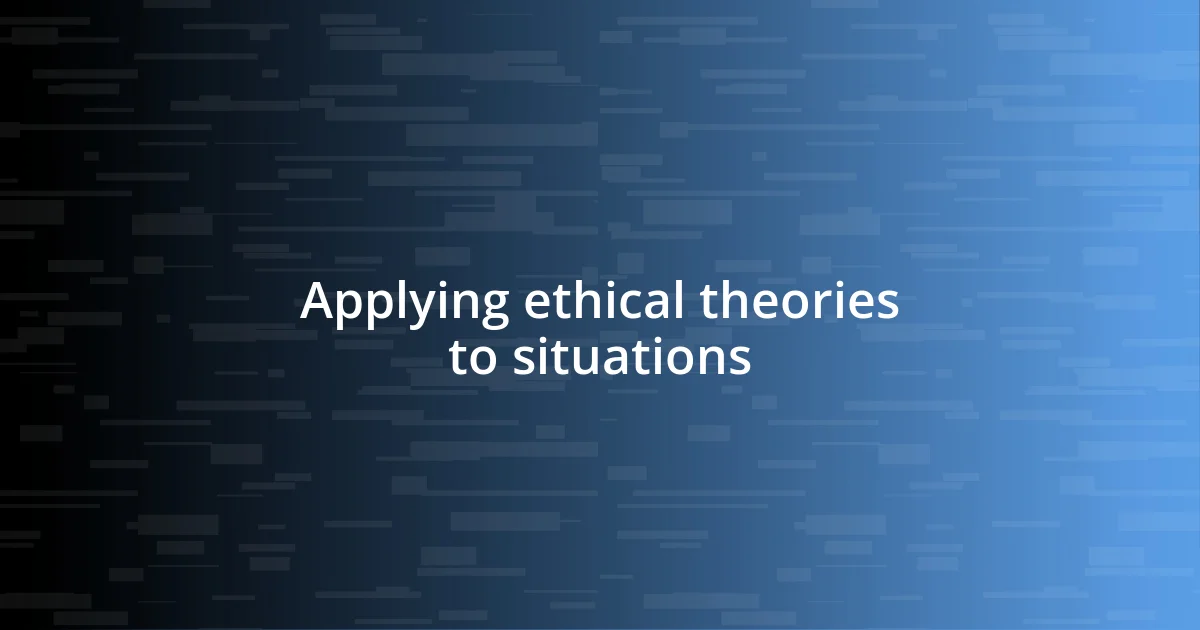
Applying ethical theories to situations
When faced with ethical dilemmas, I often rely on ethical theories to guide my decision-making process. For instance, utilitarianism, which focuses on the greatest good for the greatest number of people, often clashes with the rights-based approaches that emphasize individual rights. In a personal experience, I had to choose between publishing a controversial piece that could raise public awareness about systemic issues or withholding it to protect vulnerable individuals affected by the narrative. This led me to reflect on the consequences of my actions and the balance of benefits against potential harm.
Another theory I frequently consider is deontology, which prioritizes adherence to moral rules and duties over the consequences. I vividly recall a situation involving a whistleblower who shared critical information about corruption. Though the story had the potential to expose wrongdoing, it also put the whistleblower’s safety at risk. By adhering to my ethical obligations, I focused on ensuring their protection while responsibly reporting the information, highlighting how a principles-based approach shaped my journalistic integrity.
Additionally, virtue ethics emphasizes the character and integrity of the journalist. There was a moment in my career when I received a tip-off about a sensitive matter. Instead of rushing to report, I took the time to consider whether it aligned with my principles of honesty and fairness. The choice to verify facts meticulously and consider the ramifications for those involved truly underscored the importance of cultivating ethical virtues in our profession.
| Ethical Theory | Description |
|---|---|
| Utilitarianism | Focuses on the greatest good for the greatest number, assessing the overall impact of decisions. |
| Deontology | Prioritizes adherence to moral rules and duties, often regardless of the outcomes. |
| Virtue Ethics | Emphasizes the character and integrity of the journalist, aiming to cultivate ethical virtues. |
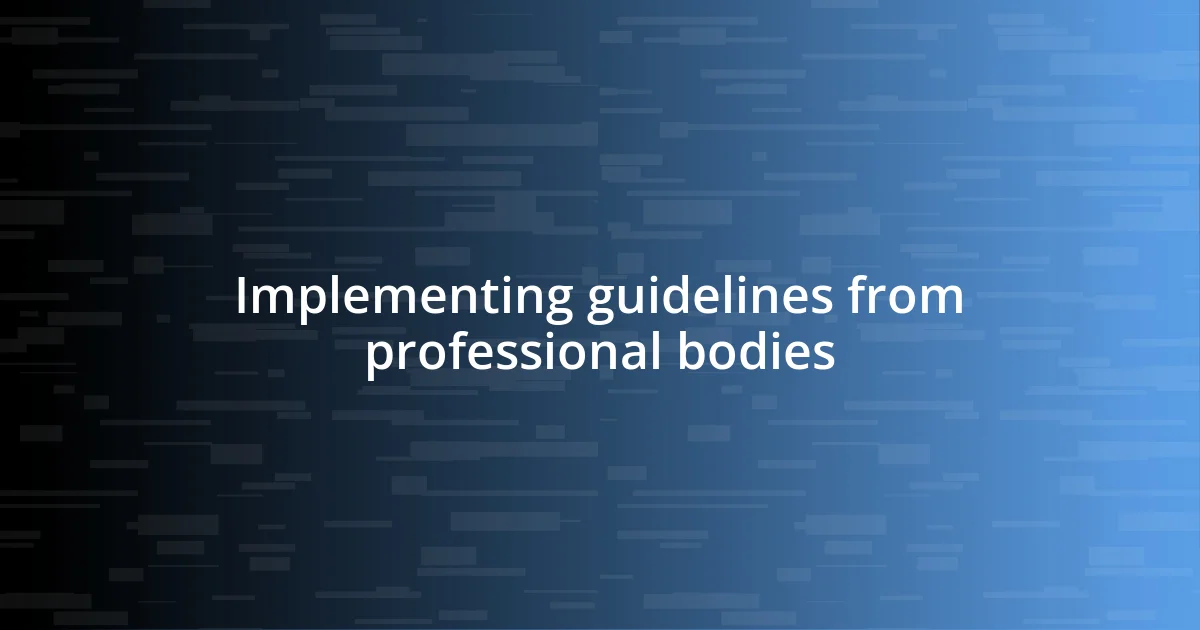
Implementing guidelines from professional bodies
Implementing guidelines from professional bodies is essential in navigating the ethical landscape of journalism. I’ve often turned to the Society of Professional Journalists’ Code of Ethics as a touchstone in challenging moments. For instance, while covering a sensitive topic, I specifically recalled their principle of minimizing harm, which prompted me to reassess how my words could impact those I was reporting about. It’s amazing how a simple guideline can reshape your perspective.
There was a time when I received a tip about a high-profile public figure involved in a scandal. The excitement to break the story was palpable. However, I paused and consulted the ethical guidelines, reminding myself of the necessity of truthfulness and fairness. It hit me—how would I feel if the roles were reversed? This reflection not only grounded my decision-making but also reinforced the importance of professional standards that advocate for responsible journalism.
Looking back, I realize that these guidelines really serve as both a compass and a safety net. When I found myself in a tricky situation with potential conflicts of interest, it was the ethics framework that guided me to disclose my relationship with a source rather than jeopardize my integrity. Isn’t it reassuring to know that such resources exist, providing clarity and accountability in an ever-complex field like journalism?
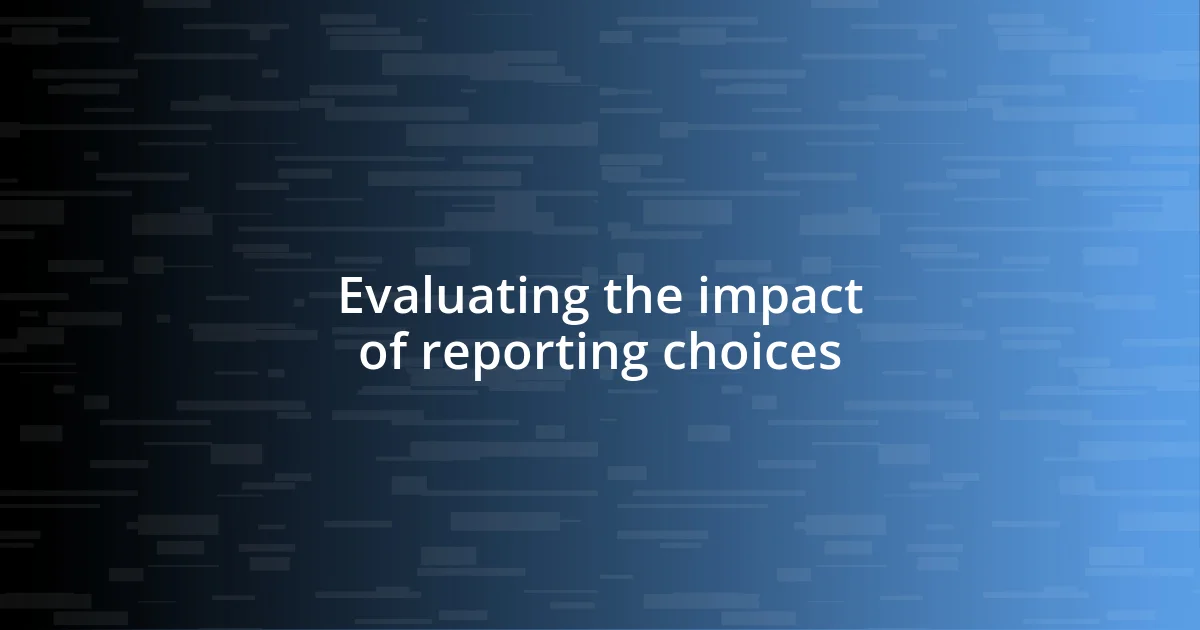
Evaluating the impact of reporting choices
When I examine the consequences of my reporting choices, I often find myself reflecting on the immediate and long-term effects they can have on the individuals involved. For instance, I once reported on a local protest movement that was gaining momentum. While it was exhilarating to bring attention to an important cause, I worried about the backlash that some participants might face as a result of their visibility. Did the benefits of highlighting their struggles outweigh the potential risks? That’s a question that haunted me even after the stories went live.
I can’t help but remember a time when I chose to omit specific details from a story to protect a victim’s identity. The story was gray, full of nuanced truths, and while many colleagues argued for full transparency, I believed that the emotional toll on the individual warranted extra caution. It was tough to reconcile that decision, but knowing I could potentially shield someone from further harm felt like the right thing to do. It’s fascinating how a single choice can pivot the entire narrative and influence public perception.
Analyzing reporting choices also extends to understanding broader societal implications. I recall grappling with how to report on a controversial issue in my community, where different segments had conflicting views. I often ask myself: Whose voices are being amplified, and whose are being silenced? This reflection resonates deeply with me, as it’s a reminder of our responsibility to provide a fair platform for all perspectives, even when it’s tempting to favor the most sensational story. In journalism, our choices matter—it’s a weighty realization that continuously shapes my approach.
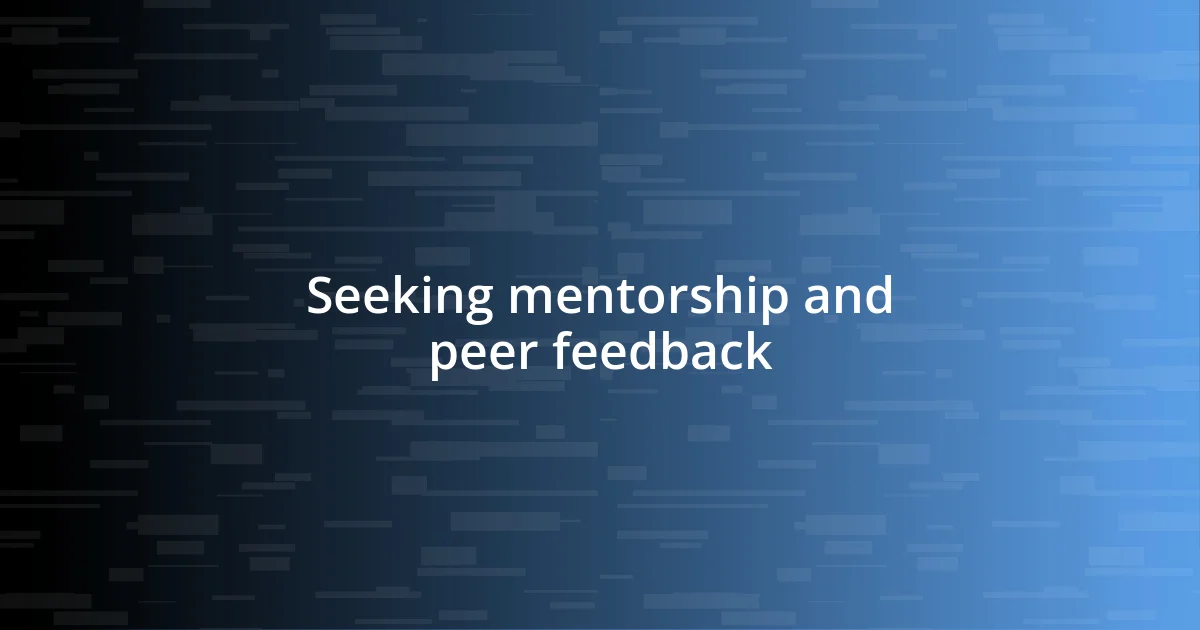
Seeking mentorship and peer feedback
When it comes to navigating ethical dilemmas, I’ve found that seeking mentorship has been invaluable. There was a time when I faced a deeply complex story involving community leaders with differing views. I reached out to a mentor who had years of experience under their belt. Their perspective not only provided clarity but also helped me understand the nuances of handling interviews with sensitivity. It was enlightening to hear their strategies and realize that sometimes, I just needed guidance to see the situation from multiple angles.
Over the years, I’ve made it a habit to share my drafts with colleagues for peer feedback. This collaborative approach has not only improved my work but often unveiled ethical considerations I hadn’t previously considered. I recall a specific instance when a colleague pointed out a potential bias in my wording that I had missed. Their insights made me rethink how I portrayed certain subjects, reminding me that two heads are often better than one in this field.
I constantly ask myself: How can we grow if we aren’t open to feedback? Each time I seek advice or critique, I’m reminded of the learning curve we all navigate. It reinforces my belief that continual learning and conscious reflection can enhance our ethical framework in journalism. Embracing mentorship and peer review isn’t just about improving stories; it’s about fostering a culture of accountability and responsibility that helps us all strive for excellence.
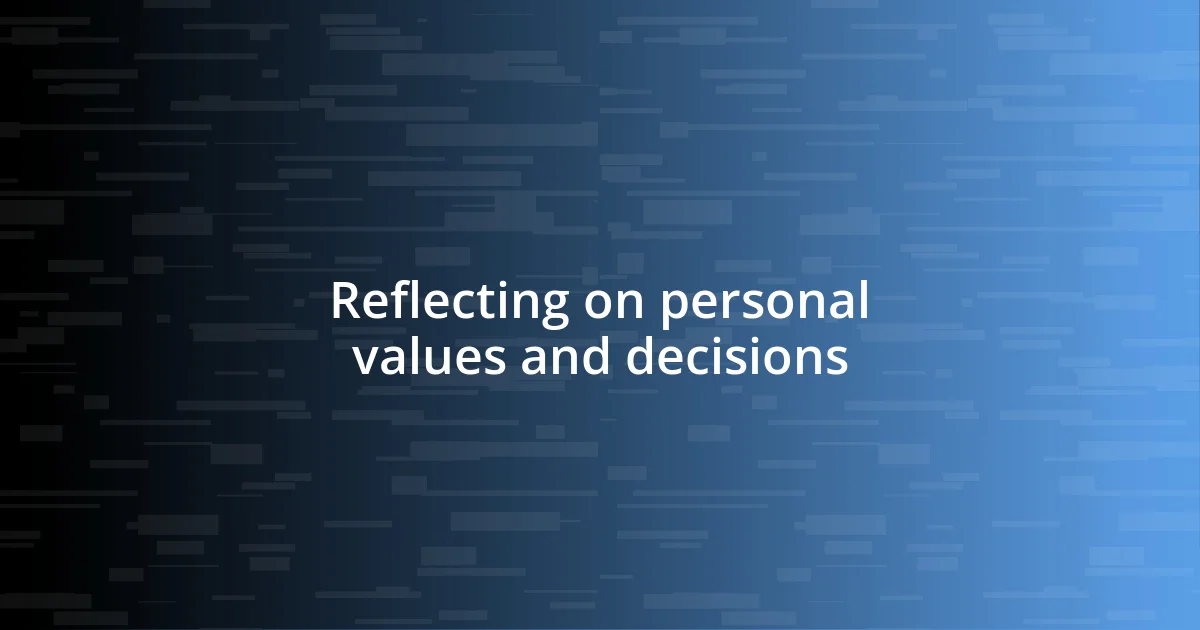
Reflecting on personal values and decisions
Reflecting on personal values plays a crucial role in how I handle ethical dilemmas in journalism. A few months ago, I had to decide whether to expose the shortcomings of a local business that was beloved in the community. I wrestled with my feelings—honesty versus loyalty. It felt like a tightrope walk; I wanted to uncover the truth but didn’t want to hurt a place that brought joy to many. In the end, I chose a path that included the facts while emphasizing room for improvement. Doing so aligned with my belief in constructive criticism over destructive exposure.
In other instances, I find myself reflecting on my upbringing and how it shapes my reporting decisions. Growing up in a diverse neighborhood, I learned to appreciate different perspectives. This background informs my approach to reporting, prompting me to ask, “What does this story mean to the communities involved?” It pushes me to dig deeper and understand the emotional undercurrents, helping me bring a more compassionate lens to my work. I aim to celebrate voices that are often left unheard, even when that means challenging popular narratives.
Each time I face a tricky decision, I remind myself to pause and evaluate: “What values am I upholding in this moment?” There was a time I had to report on sensitive information regarding a public figure. As I weighed whether to include certain details, I felt a pang of empathy for their family. Ultimately, I chose restraint, prioritizing their dignity over sensationalism. It was a defining moment that reaffirmed my commitment to ethical standards, showing me that my values should serve as an anchor in the fast-paced world of journalism.




